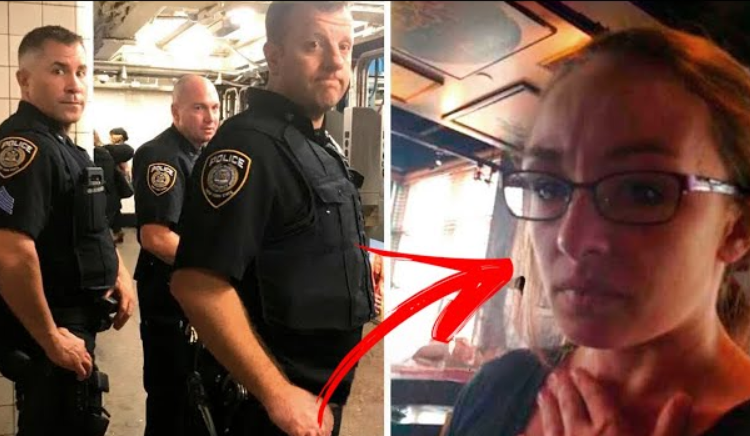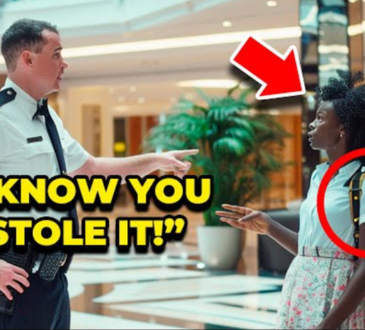
A waitress always served an elderly man who came to the restaurant for lunch. However, when he simply stopped coming, the young woman discovered something that made her heart stop. No one could have imagined what would happen.
Julie could hardly contain her excitement as she entered the elegant restaurant where she had landed a job at the age of 25. With big dreams and a fierce determination, she saw this opportunity as a chance to finally achieve her dreams. The restaurant, known for its distinguished clientele and exceptional dishes, promised not only a good salary but also the chance to advance in her career. However, her enthusiasm faced a challenge on her very first day. The other employees, wanting to test her, assigned her to serve the restaurant’s most notoriously difficult customer.
“Julie, that gentleman over there is Mr. Henry. He comes here every day, and, well, he is very particular about his food,” said one of the more experienced waiters with a mischievous smile.
“Particular” sounded like a worrying euphemism to the girl. She observed from afar the man in question, an elderly man with a permanently frowning expression sitting alone at his usual table. Rumors among the staff painted a picture of someone so unpleasant that no one wanted to serve him, and now this task had fallen onto her shoulders like a test.
“Why me?” she asked, feeling a mixture of nervousness and determination. She didn’t want to start her first day on the wrong foot, but she wasn’t looking forward to dealing with a difficult client either.
“Because you’re the new girl, and that’s our rule,” they joked.
Taking a deep breath, the new waitress approached the old man’s table with a smile. “Good afternoon, sir. Welcome to our restaurant. I’m Julie, and I’ll be serving you today. Can I get you something to drink?” she asked, trying to keep her voice as friendly and firm as possible.
The old man raised his eyes, staring at her in a way that made Julie feel as if she were being evaluated by a strict critic. “Just water with lemon, no ice. These people should know what I like by now,” he complained in a voice that carried undeniable authority.
The young woman nodded, keeping her nervous smile. “I’ll bring it immediately. Any preferences for lunch on this beautiful day, or may I suggest some of our specialties?” she continued, determined not to let Henry’s reputation intimidate her.
“I want the usual, girl. I’m important here. You should know what I eat by now!” he exclaimed a little angrily.
As Julie walked away, she looked at her colleagues who were laughing, watching that poor girl suffer at the hands of the old man. But she was focused on proving that she could handle any challenge that job presented, even if that challenge came in the form of a grumpy old man.
“I think he just needed a good dose of kindness,” said the girl, with the simplicity of her belief resonating strongly among her colleagues.
From that day on, whenever Henry came to the restaurant, he would say that he didn’t want anyone other than Julie to serve him. Despite his reputation for being rude, the waitress noticed brief moments when the old man’s frown gave way to a less severe expression, especially when she served him with her usual cordiality. The waitress loved it when she received tips because she was saving money to fulfill her dream of having her own house, a home that was synonymous with stability and love, things she lacked during a childhood and adolescence marked by family neglect.
“I grew up in a broken family. There was no love, and my parents abandoned me when I needed them most,” she once shared with a colleague. “But that hasn’t changed who I am. I want to build something better for myself.”
The dream of building a different future, a loving home, was what drove her every day. She knew it wouldn’t be easy, especially considering her humble origins and the challenges she faced growing up practically on her own. However, the waitress believed that kindness and resilience were her greatest strengths, powerful weapons that helped her face even the most difficult days at the restaurant.
And so, day after day, she served the old man with the same dedication and smile, not allowing his bitterness to contaminate her essence. Julie wasn’t going to let a grumpy old man, or anyone else, divert her from her path. She was determined to save every penny to build, piece by piece, the future she had always dreamed of.
So the years went by, and the relationship between Julie and Henry, although based on daily interactions at the restaurant, began to deepen in a subtle way. Of course, he didn’t stop being rancid and scowling, but the conversations between them, initially limited to his orders, gradually became more personal.
Although the old man was very reserved, revealing only fragments of his life on rare occasions when the restaurant was less busy and the world outside seemed to slow down, the elderly man would share little bits of his story with the girl. She learned, for example, that he had a son, and that indifference and distance defined their relationship.
The old man confided, “I raised him alone, you know,” his voice filled with a mixture of pride and sadness. “After my wife died, we only had each other. But in the end, it seemed that money was more important.”
The waitress listened with empathy, being not just a waitress but also a friend. She learned about Henry’s wife, a vibrant, vivacious woman whose death left an immense void in the old man’s heart. He talked about how hard he tried to be a good father to his son, about the sleepless nights and the sacrifices he made to ensure that his son would have everything he needed, despite his often harsh posture.
Julie realized that the old man was a man who had loved deeply and lost a lot. This revelation only made her respect him even more, and perhaps that was why he was so hard on people.
And everything was going well. The daily meetings at the restaurant had become a routine. However, one day, all of a sudden, Henry stopped showing up. Days went by, and there was no sign of him. At first, Julie thought that perhaps he was ill or had decided to change his habits. But after two weeks without any news of the old man, a growing concern took hold of her.
She wondered what had happened to the old man who, despite his grumpy ways, had become an important part of her life. The man’s absence left a void not only at the table he used to occupy but also in Julie’s heart, who missed their conversations and the friendship they had developed over the years.
As the days went by, the old man’s absence became more and more noticeable to the waitress and the other staff in the restaurant. She continued her work with the same dedication as always, but her eyes often wandered to the table usually occupied by the old man, now empty.
“Do you really miss that grumpy old man?” mocked one of the cooks during their break. “I thought we were going to throw a party the day he stopped coming.”
The young woman just shook her head, a sad smile on her lips. “Yes, he was difficult, but over time you get used to it,” she defended him, remembering the conversations they’d had, the moments when the veil of bitterness would lift and reveal just a sad old man.
The co-workers exchanged glances, some with expressions of incredulity, others with a hint of respect for Julie’s compassion.
“Well, if you say so,” muttered one of them. “But let’s hope he doesn’t come back grumpier. Let’s hope he comes back a little happier.”
As time passed, Julie’s worry grew. Serving customers, she couldn’t help glancing occasionally at the door, hoping that Henry would appear, ready to take his usual order with a grunt.
However, on her day off while she was at home watching TV, some news caught her attention, cutting through the silence of her small apartment like a lightning bolt. The report detailed a corruption scandal involving a well-known millionaire, none other than Henry’s son, Ronald Tilton. As a result of the investigations, his and his father’s accounts had been frozen, leaving them without access to their funds. And the old man, too, had become a suspect.
Julie felt her heart squeeze when she heard the news, but what came next left her completely breathless. After an intense fight with his son, the old man took his car and drove off down the road, where he was involved in a serious car accident. He was hospitalized in critical condition and with no money available due to frozen accounts, he couldn’t pay for the surgery he urgently needed.
The news showed images of the accident, of the wrecked car, and the waitress could hardly believe that fate could be so cruel to a man who had already suffered so much. Tears welled up in her eyes at the thought of the old man alone and wounded, abandoned even by the son he had supported so much.
“Oh my God,” she muttered, indignation growing inside her.
With the decision made in her heart, Julie knew what she had to do. She couldn’t let Henry die alone, not after everything he’d been through. With determination, the girl, now in her 30s, didn’t hesitate for a second. The five years of savings, every penny she had saved for her dream of a home, were about to go to an unexpected cause, but one that her heart knew was right.
She rushed to the hospital, urgency pulsing through every step, driven by a mixture of anxiety and fear. When she got there, she found a cold and indifferent bureaucracy. She couldn’t believe that a person’s life could be in danger because of a lack of financial resources.
“How can you just leave him there, suffering, waiting for the surgery that could save his life?” she exploded, confronting the doctors and administration with fervent fury. “Your duty is to save lives, not to decide who deserves to be saved based on how much money they have!”
Her voice echoed through the corridors, attracting stares from patients, visitors, and staff. Some were shocked by the intensity of her defense, others showed a glow of admiration and support.
The waitress, however, wasn’t there to please or shock anyone. She was there on a mission to ensure that Henry, the man who had become part of her life, received the treatment he needed. With her savings in hand, she said, “Here’s the money. Now do something.”
Julie did what many would consider unthinkable: she paid for the old man’s surgery. The act was not just a show of generosity but a testament to the character and strength of the young woman, a woman who, despite personal adversity, chose to make a difference in someone else’s life.
Days later, when Henry finally woke up after the surgery, he found her sleeping in the chair next to him, a constant presence offering him comfort and hope. When he found out that it was she who had paid for the surgery, tears of gratitude mixed with emotion welled up in his eyes.
“How can I repay you, my dear?” he asked, his voice laced with emotion.
“You can repay me by recovering quickly and going to eat at the restaurant to give me more tips,” she joked, holding the old man’s hand.
The man told the waitress the truth about his son, who had the money but had chosen not to help his father. “He said to my face that he’d be better off if I died because then he’d get his inheritance,” the old man confided.
The words broke the young woman’s heart, who listened in silence, indignation boiling inside her.
“If you need anything, Mr. Henry, I’m here for you,” Julie promised with a gentle smile.
In the days that followed, she kept her promise, visiting him every day after work, dedicating her time and attention to the man who began to see her as the daughter he never had. The young woman’s ability to care for, love, and sacrifice herself for others meant that for Henry, Julie became not just the waitress who served him for years, but a beacon of hope and a daughter.
After months of legal battle, in the midst of Henry’s recovery, the truth finally came out about the scandals involving his family. With determination and the help of competent lawyers, the old man managed to prove his innocence in the corruption cases involving his son. The process was arduous and exhausting, but justice prevailed. His son was held accountable for his actions and imprisoned, while the old man managed to recover all the possessions and assets.
In a gesture of immense gratitude and recognition, the old man decided to put everything owned in Julie’s name. The woman was astonished and almost fell over backwards when he brought the documents for her to sign. For him, the girl was not just the kind waitress who turned his bitter days into moments of joy; she had truly become a daughter, someone who demonstrated the true meaning of family, not by blood ties but by heart ties.
“You’ve saved me, dear, in more ways than you can imagine,” he said when he told her about the transfer of possessions. “I want you to have the stability and the home you’ve always dreamed of.”
Julie touched, accepted the generous gesture but made a point of going further. She took the old man to live with her in their new house, a home that was now theirs. She saw him as the father, forming a family chosen out of affinity and love.
Despite the new life that awaited her, the young woman decided to continue working as a waitress. The job, which was initially just a means to an end, had become a significant part of her life. After all, it was through it that she found happiness. Henry changed her life, and she discovered the joy in serving and connecting with people.
The story of that simple waitress became well-known in the restaurant, a tale of how kindness and empathy can transform lives in unexpected ways. And so, the woman lived her new life with her father by her side. Together, they shared laughs, meals, and the certainty that no matter what fate had in store, the two of them would always have each other.
The waitress who once dreamed of a house to call home now had much more: a family, a home full of love, and the certainty that choices made with the heart always lead to the right path.




